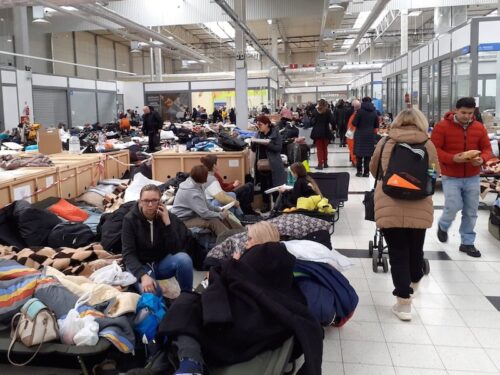PROSPECT HEIGHTS — When Caroline Brennan met Ukrainian refugee Mahamudoff Gazym at an overcrowded bus station in Otaci, Moldova, he spoke about the questions his grandchildren ask that he doesn’t have a concrete answer to: “Who is making all the sounds of the bombs? How long are we going to sleep in the car?”

“I know this is really happening — what my eyes can see my heart cannot accept,” Brennan recalled Gayzm told her. “I just want the world to see what’s going on. I don’t want war.”
Brennan is the emergency communications director for Catholic Relief Services. She’s assisted Ukrainian refugees that cross the border into Moldova since March 1 and anticipates being there for at least another two or three weeks. CRS in recent weeks has increased its presence across Eastern Europe in Ukraine, Moldova, Romania, and Poland. She said there are now about 20 external CRS staff in Moldova.
Brennan recently spoke with The Tablet about what she’s seen, and what CRS, with its Caritas Internationalis partners in Moldova, are doing to support refugees both emotionally and physically by providing information, counseling, and essentials like food and supplies.
“It’s just a swirl of uncertainty,” Brennan said. “When you walk into these bus stations at the border crossing they are so crowded and you just see people filled with tears. Eyes are red and swollen from weeping and crying and you just have people who are truly exhausted.”
Moldova borders southwest Ukraine. It’s a small country — about the size of Maryland — in between Ukraine and Romania with a population of about four million. It’s one of the poorest countries in Europe. Of the two million people that have fled Ukraine since the Russian invasion began on Feb. 24, at least 230,000 have crossed into Moldova, according to the United Nations Office for the Coordination of Humanitarian Affairs (OCHA).
Brennan said the backstories of the refugees she’s encountered differ, but the uncertainty of what comes next is a common thread that they all share. She said people are weighing whether or not to stay and apply for asylum, travel through Moldova to Romania to be in a country that is part of the European Union, and whether or not they’ll ever return to Ukraine.
“These are decisions that will change the trajectory for the rest of their lives,” Brennan said. “There are just questions that people don’t know because there’s so much uncertainty.”
When Brennan met Gayzm on Saturday he was charging his phone. Gayzm then showed her his car — packed to the brim with whatever he, his wife, and their three grandchildren could take with them from Ukraine. It’s also served as the family’s sleeping quarters since March 1. Gayzm isn’t new to international displacement, either. He fled Azerbaijan to Ukraine 20 years ago.
“Now I am a refugee again, but where to? I don’t know,” Brennan said Gayzm told her.
Brennan said there are a number of Ukrainian refugees in Moldova like Gayzm who were not born Ukrainian citizens and were refugees from other countries like Afghanistan, Vietnam, China, and Azerbaijan who never thought they would experience displacement like this again. Then there are native Ukrainians who were “torn from their roots” because of the invasion. Brennan said a large percentage of the refugees are women and children that were separated from their husbands and fathers at the border. The Ukrainian government has mandated that men aged 18 to 60 are not allowed to leave the country.
“You’re having to navigate this environment that’s already scary, where you don’t have your partner with you, and just getting information and knowing who to trust are sort of foundational in terms of the risk that you’ll face,” Brennan said. “So a big role that Caritas is playing at these transit sites is being recognized as a formal trusted source to help provide that information.”
That information includes what kind of social services are available to them from the government and other agencies, what options they have, and ways to contact their loved ones. They’re also providing counseling and emotional support to both women and children, in addition to providing food, blankets, and hygiene supplies.
CRS is also rolling out electronic financial assistance to Ukrainian refugees, likely in the form of a debit card, Brennan said, that allows families to buy supplies specific for their needs while on the move and gives CRS the ability to up the amount over time.
Brennan also highlighted the efforts of Moldovans in providing support at border sites to help however they can. She told The Tablet about an encounter she had with Valeri Perov — a Moldovan helping refugees at the Otaci border — who explained the closeness he felt to the Ukrainian refugees seeing them in person and how that led him to help.
“When you actually talk to people and they tell you their apartment or home was destroyed five hours after they left, you feel the energy, which is humanity,” Brennan said Perov told her. “I’ve noticed that women and children are crying, they are scared and disoriented. They don’t know where to go. They are not expecting people to be here to help. We are not a rich country, but we are here helping, out of our pocket.”
